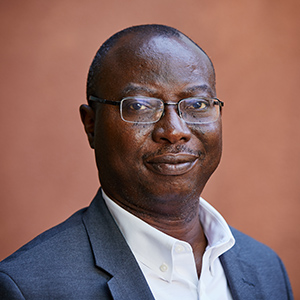The International HapMap Project was an organization that aimed to develop a haplotype map (HapMap) of the human genome, to describe the common patterns of human genetic variation. HapMap is used to find genetic variants affecting health, disease and responses to drugs and environmental factors. The information produced by the project is made freely available for research.

Human genetic variation is the genetic differences in and among populations. There may be multiple variants of any given gene in the human population (alleles), a situation called polymorphism.
The Baylor College of Medicine Human Genome Sequencing Center (BCM-HGSC) was established by Richard A. Gibbs in 1996 when Baylor College of Medicine was chosen as one of six worldwide sites to complete the final phase of the international Human Genome Project. Gibbs is the current director of the BCM-HGSC.
Himla (Himladevi) Soodyall is a South African geneticist involved in finding some of the oldest human genetic lines, mainly focusing on Sub-Saharan Africa. Her work on DNA has pointed to southern Africa as the most likely geographic region of origin of the human species.
Clement Adebamowo is a Nigerian medical researcher and academic. Born in Lagos, Nigeria, Adebamowo is currently Director For Global Health Cancer Research, and a professor of Epidemiology & Public Health, at the University of Maryland School of Medicine. He is known for his work in cancer epidemiology, nutrition epidemiology, and research ethics, particularly in low resource and under-served in Africa.
Dr. Vinod Scaria FRSB, FRSPH is an Indian biologist, medical researcher pioneering in Precision Medicine and Clinical Genomics in India. He is best known for sequencing the first Indian genome. He was also instrumental in the sequencing of The first Sri Lankan Genome, analysis of the first Malaysian Genome sequencing and analysis of the Wild-type strain of Zebrafish and the IndiGen programme on Genomics for Public Health in India
Mitali Mukerji is a Professor and Head of the Department of Bioscience and Bioengineering, IIT Jodhpur. She was formerly a Chief Scientist at the CSIR Institute of Genomics and Integrative Biology with notable achievement in the field of human genomics and personalized medicine. She is best known for initiating the field of "Ayurgenomics" in partnership with her colleague Dr. Bhavana Prasher under the mentorship of Prof. Samir K. Brahmachari. Ayurgenomics is an innovative study, blending the principles of Ayurveda- the traditional Indian system of medicine- with genomics. Mukerji is also a major contributor in the Indian Genome Variation Consortium, a comprehensive database that is producing "the first genetic landscape of the Indian population", and has been an author in many publications that use IGV databases to study population genomics. Mukerji has done extensive research on hereditary ataxias, and is involved in many other projects related to tracking disease origins and mutational histories. She is the recipient of the prestigious Shanti Swarup Bhatnagar Award in 2010 for her contribution in the field of Medical Sciences.
Bongani Mawethu Mayosi BMedSci, MB ChB, FCP(SA), DPhil, was a South African professor of cardiology He was the Dean of the Faculty of Health Sciences at the University of Cape Town and an A-rated National Research Foundation researcher. Prior to this, he was head of the Department of Medicine at the University of Cape Town and Groote Schuur Hospital. his research interests included rheumatic fever, tuberculous pericarditis and cardiomyopathy. He was a member of the Academy of Science of South Africa and a former President of the College of Physicians of South Africa and he headed numerous other biomedical organisations during his career.

In genetics, a polygenic score (PGS), also called a polygenic index (PGI), polygenic risk score (PRS), genetic risk score, or genome-wide score, is a number that summarizes the estimated effect of many genetic variants on an individual's phenotype, typically calculated as a weighted sum of trait-associated alleles. It reflects an individual's estimated genetic predisposition for a given trait and can be used as a predictor for that trait. In other words, it gives an estimate of how likely an individual is to have a given trait only based on genetics, without taking environmental factors into account. Polygenic scores are widely used in animal breeding and plant breeding due to their efficacy in improving livestock breeding and crops. In humans, polygenic scores are typically generated from genome-wide association study (GWAS) data.

Charles Nohuoma Rotimi is the Scientific Director of the National Human Genome Research Institute (NHGRI). He joined the National Institutes of Health (NIH) in 2008 as the inaugural Director of the Trans-NIH Center for Research in Genomics and Global Health and was also the chief of the NHGRI's Metabolic, Cardiovascular, and Inflammatory Disease Genomics Branch. He works to ensure that population genetics include genomes from African populations and founded the African Society of Human Genetics in 2003 and was elected its first president. Rotimi was instrumental in the launch of the Human Heredity and Health in Africa (H3Africa) with the NIH and the Wellcome Trust. He was elected to the National Academy of Medicine in 2018.

Emmanouil Theophilos Dermitzakis is a Greek human geneticist and professor in the Department of Genetic Medicine and Development at the University of Geneva, where he is also Director of the Health 2030 Genome Center. He is an ISI Highly Cited Researcher and an elected member of the European Molecular Biology Organization. He is a member of the Swiss Institute of Bioinformatics, where his research group is focused on the genetics and genomics of complex traits in humans. He has joined GlaxoSmithKline as Vice President, Computational Biology in R&D.
Cohorts for Heart and Aging Research in Genomic Epidemiology, abbreviated CHARGE, is a consortium formed to facilitate meta-analyses of genome-wide association studies of aging and cardiovascular traits, and the replication of genotype–phenotype associations identified in such studies. CHARGE was initially launched in 2008 as a voluntary collaboration between five prospective cohort studies: the Age, Gene/Environment Susceptibility-Reykjavik Study (AGES) in Iceland, the Atherosclerosis Risk in Communities Study, the Cardiovascular Health Study, and the Framingham Heart Study in the United States, and the Rotterdam Study in the Netherlands. Other cohort studies have joined the consortium since its founding, including the Multi-Ethnic Study of Atherosclerosis and the Coronary Artery Risk Development in Young Adults Study. The organization of the consortium consists of a Research Steering Committee, an Analysis Committee, a Genotyping Committee, and roughly 35 phenotype-specific working groups.
Charmaine DM Royal is an American geneticist and Associate Professor at the Institute for Genome Sciences & Policy and the Department of African and African American Studies at Duke University. She studies the intersections of race, ethnicity, ancestry genetics, and health, especially as they pertain to historically marginalized and underrepresented groups in genetic and genomic research; and genomics and global health. Her major interest is in addressing root causes and implementing sustainable solutions regarding problems of race and racism in research, healthcare, and society. Royal is a Human Heredity and Health in Africa (H3Africa) Independent Expert Committee (IEC) member appointed by the National Institutes of Health (NIH) and is a 2020 Ida Cordelia Beam Distinguished Visiting Professor at the University of Iowa.
Misaki Wayengera is a Ugandan physician, academician, and a medical researcher. He serves as a lecturer for Pathology, Immunology and Molecular Biology at Makerere University College of Health Sciences. He is the chairperson of Uganda's Scientific Advisory Committee on COVID-19 for the Ministry of Health and the National Task Force.

Neil Hanchard is a Jamaican physician and scientist who is clinical investigator in the National Human Genome Research Institute (NHGRI), where he leads the Childhood Complex Disease Genomics section. Prior to joining NHGRI, he was an associate professor of molecular and human genetics at the Baylor College of Medicine. He is a fellow of the American College of Medical Genetics and Genomics,. Hanchard's research focuses on the genetics of childhood disease, with an emphasis on diseases impacting global health.

Vence L. Bonham Jr., J.D. is the acting Deputy Director of the National Human Genome Research Institute (NHGRI) of the U. S. National Institutes of Health, and is the leader of the NHGRI Health Disparities Unit. His research focuses on social determinants of health, particularly with regard to the social implications of new genomic knowledge and technologies.

The African Society of Human Genetics (AfSHG) is a learned society and professional membership organization focused on the study of human genetics and genomics in Africans, and open to researchers who are interested in the subject. It has played a role in founding several national genetics societies, and is affiliated with the societies of Cameroon, the Democratic Republic of the Congo, Mali, Egypt, Rwanda, Senegal, South Africa, and Tanzania.

Tara Matise is an American geneticist at Rutgers University. Since 2018, she has served as chair of the Department of Genetics. Her research interests span computational genetics, data science, and human genetics. She is co-director of the Rutgers University Genetics Coordinating Center.

Adebowale A. Adeyemo is a Nigerian physician-scientist and genetic epidemiologist specialized in genomics and cardiometabolic disorders. He is the deputy director and chief scientific officer of the Center for Research on Genomics and Global Health at the National Human Genome Research Institute.
Alan Christoffels is a bioinformatics scientist, academic, and an author. He is Professor of Bioinformatics, and the director of the South African National Bioinformatics Institute at the University of the Western Cape. He has been serving as a senior advisor to the Africa Centres for Disease Control and Prevention Pathogen genomics & Partnerships and DSI/NRF Research Chair in Bioinformatics and Public Health Genomics.









